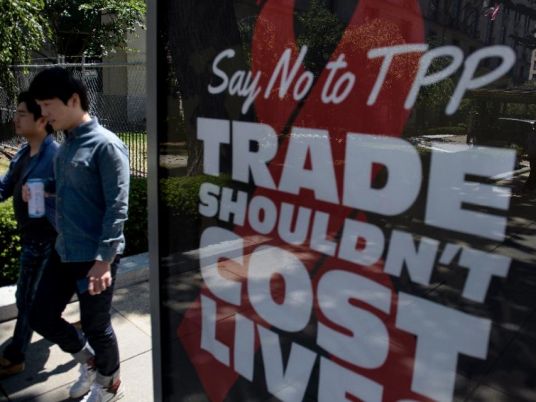
With the end game in sight to what could be the world's most ambitious trade deal, critics fear a controversial mechanism to protect investors will strengthen the hand of big business while eroding national sovereignty.
The Trans-Pacific Partnership (TPP) — a wide-ranging accord that would encompass 40 percent of the world's trade — could be sealed in Hawaii this week after more than five years of talks.
The United States, the chief architect of the ambitious pact which takes in 11 other Pacific Rim countries, says it would loosen trade restrictions, drive jobs growth and encourage investment by strengthening legal protection for companies.
But critics say it favours multinational corporations over state interests and individual consumers, pointing in particular to a proposed investor-state dispute settlement (ISDS) mechanism that would allow foreign companies to sue governments, likely through international tribunals.
They warn ISDS cases might expose states to potentially huge liability claims — a bigger risk for developing countries that do not have deep pockets — and may also threaten their ability to introduce health and environmental laws.
That is a particular issue because there are several developing countries among the prospective members, which are Australia, Brunei, Canada, Chile, Japan, Malaysia, Mexico, New Zealand, Peru, Singapore, the US and Vietnam.
"There are risks for all governments involved in the TPP in relation to the investor-state dispute settlement," Matthew Rimmer, an intellectual property expert at the Queensland University of Technology, told AFP.
"Under the regime, investors — particularly multinational companies — can bring actions against governments, but governments cannot bring actions against corporations.
"So it's a very one-sided regime and it can provide special rights to foreign investors that are not present for domestic investors."
– Cases on the rise –
The issue has become a particularly hot topic in Australia, which was sued by tobacco giant Philip Morris after it became the first country to introduce plain packaging laws for cigarettes in 2012.
Canberra refused to reveal its legal bill for defending the claim from Philip Morris, which argued the legislation breached a bilateral investment treaty.
The case, and broader concerns about ISDS processes, saw Australia's top judge Chief Justice Robert French warn last year that claims tribunals could undermine domestic legal jurisdictions.
Philip Morris' suing of Uruguay after the country ordered that the health warnings be larger on cigarette packets helped prompt billionaires Bill Gates and Michael Bloomberg to launch a fund to support developing states in their legal battles with tobacco giants.
On a global scale, the number of cases brought by companies against governments has been on the rise in recent years, according to figures from the United Nations Conference on Trade and Development (UNCTAD).
Out of 608 known cases brought between 1987 and 2014, more than a quarter of them were over the past three years, UNCTAD said, adding that confidentiality agreements meant there were likely more.
Of particular concern to ISDS opponents, less developed economies have faced a larger proportion of such suits, although the relative share of cases against developed countries is on the rise.
Meanwhile, most litigation was started by investors from developed countries — particularly from the US, Canada and several European Union nations — accounting for more than 80 percent of all claims.
– 'Blunt instrument' –
Tim Harcourt, former chief economist at Australia's trade promotion body Austrade, said the ISDS was a "blunt instrument" to protect companies' interests.
"Giving international companies the right to sue countries left, right and centre is probably not the way to build those (free trade) institutions," he told AFP.
"The way to protect investors is by building local institutions so they're transparent, and ultimately countries that don't have transparent institutions like Venezuela, people won't invest there."
Concerns have also been raised in the United States, including by influential Democratic Senator Elizabeth Warren.
"ISDS would allow foreign companies to challenge US laws — and potentially to pick up huge payouts from taxpayers — without ever stepping foot in a US court," she said.
But Alan Oxley, the first Australian to chair the General Agreement on Tariffs and Trade (GATT), the World Trade Organization's predecessor, said fears that the ISDS favours international business over governments were overblown.
He said an international arbitration tribunal would be an effective way to settle claims as it gave foreign investors an automatic right to appeal without government approval.
Australia's foreign affairs department has released a "myth versus realities" TPP document that stresses an ISDS tribunal "could not overturn domestic court decisions nor force Australia to change its laws".
"If you talk to anybody in business, they'll say that's a good idea, whereas the opposition is coming from quite a small fringe group," Oxley, who heads up the Australian APEC Study Centre at RMIT University, told AFP.
